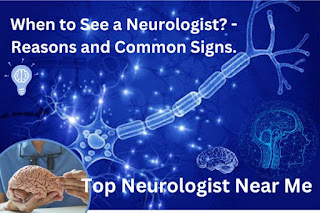When to See a Neurologist? - Reasons and Common Signs.
Introduction
The primary concern of an individual experiencing a symptom is "Which specialist should I contact?" However, you should consult a neurologist if you are concerned about pain in your legs, back, neck, or lower back. In addition, there are numerous other indications of this:
decline in vision;
persistent lightheadedness;
back, neck, and limb pains;
limb tremors and spasms;
hands and feet numbness;
problems with sleep, memory, and focus;
poor verbal function, dizziness, and lack of coordination.
Nervous system diseases encompass a broad spectrum of medical conditions. This can show up as a number of symptoms. Therefore, you should consult a neurologist if you exhibit any symptoms of nervous system degradation. The causes of the illness will become clear after a professional consultation. Additionally, it aids in choosing the best course of action for treating the patient's condition. The most important prerequisite for a neurologist to treat a patient further is a prompt and well-established diagnosis. If you have any seriousness about one of them and want to search for the Top Neurologist nearby then google ”top neurologist near me” You will find a list of top Neurologists.
Top 10 Motives for Visiting a Neurologist
These days, it is hard to find someone who does not struggle with joint, head, and back pain. These problems are caused by stress, a sedentary lifestyle, unhealthy habits, and other factors. And it affects both young people and old people. So, you should be aware of when to consult a neurologist in order to prevent this. There are numerous justifications for doing it as well.
1. A decrease in sensitivity
Any area of the body can lose its sensitivity. It feels like a freezing sting on a certain body region. A person then experiences some tingling. It is typical at times. However, it is not ideal when the sensitivity frequently or completely vanishes. Because you most likely have issues with your central nervous system if this occurs throughout your body. Additionally, these bodily cues advise visiting a neurologist. They identify the decrease of sensitivity based on particular injury locations:
peripheral nerve
In the innervation site, paresthesias and pain are present. Eventually, it manifests as a loss of all sensibilities.
damage to the transverse spinal cord
loss of all sensitivity levels on one side below the lesion.
intramedullary injury
reduction of pain and heat sensitivity while maintaining profound sensitivity.
2. Vegetative-vascular dystonia diagnosis (VSD)
If you have received a diagnosis of it at least once, you ought to consult a neurologist. because it can serve as a cover for other illnesses. VSD is generally considered to be an autonomic nervous system condition. With this diagnosis, medical professionals note the following symptoms:
Feeling under the weather;
Pale or red skin after exertion;
elevated heart rate;
increased sweating;
headache;
heart pain;
fast heartbeat;
elevated body temperature;
anxiety;
dizziness;
pressure spikes or falls.
A malfunction in the neurological system is the cause of all these symptoms. And if this is something you experience frequently, you should consult a neurologist. They will treat you and make improvements to your autonomic nervous system.
3. Back and neck discomfort
They indicate osteochondrosis. Pain may not only be in the back or neck, depending on the area affected:
In addition, your lower back and chest both feel it.
The intervertebral discs are most frequently impacted by osteochondrosis.
You may develop an intervertebral hernia if the condition progresses. To treat it, you will then require an appointment with a neurologist and brain specialist.
4. Visual deficiency
Aging naturally can cause visual impairment. However, it may also indicate issues with how the neurological system functions. When to consult a neuroscientist:
If it occurs unexpectedly both eyes are affected.
if you have a sudden decrease in visual acuity and a shift in diplopia.
If you frequently notice your eyes becoming darker. Particularly when you abruptly shift your body's position.
5. A headache
Back pain, aching teeth, or stuffy noses can all trigger headaches. Vomiting may occur in conjunction with headaches that are more severe, like migraines. Additionally, you ought to see a neurologist and brain expert if this occurs frequently:
It may arise on its own or get worse under pressure.
Additionally, it may result in visual abnormalities or even convulsions.
Such a headache frequently indicates a serious illness of the nervous system.
If the pain is severe and persistent, it is very important to pay attention.
Sadly, there's a common belief that you can endure any amount of pain. However, this is not something you ought to do. After all, an extended occurrence of the same discomfort may be a sign of internal health issues.
6. Dizziness
Vertigo is becoming more and more common. And most people don't care about it. Ultimately, they think that this is a typical sign of physical overuse or body fatigue. Unfortunately, though, dizziness is an indicator of physical problems:
If this is something you experience frequently, it suggests neurological issues.
You should get in touch with any kind of neurologist in such circumstances.
Additionally, dizziness might take on distinct forms. If you feel like you or the items around you are spinning, a neurologist can assist.
7. Disorders of movement
Movement disorders can affect a person at any point in their life. Among them are:
walking is difficult.
Incompetence.
movements that are not voluntary.
Handshakes.
Instability and shift in walking style.
While walking, adjust your posture.
It also includes having trouble shifting one's body's posture. You cannot, for instance, stand on your toes or heels. Seek professional assistance if these issues significantly hinder your life. How would a neurologist respond in this case? They look for the root of the issue and work to address it as quickly as they can.
8. Sleeplessness
Disorders related to sleep are a somewhat prevalent issue. It frequently happens to 30-45% of individuals. Research has indicated that these conditions may arise in the context of neurological illnesses. These could be:
Depression, anxiety, and panic attacks.
Insomnia is unavoidable if these conditions frequently cause you to feel distressed emotionally. The issue is that it eventually develops into more significant neurological issues. Consequently, the onset of insomnia indicates when to consult a neurologist.
9. Seizures
Convulsions can range in severity from hardly perceptible to excruciating:
Attacks may manifest as a frozen stare followed by unconsciousness.
Another possibility is a twitch of the lower and upper limb muscles.
It involves breathing difficulties, disorientation, or fainting.
Sometimes low blood sugar levels cause this to occur. However, assaults can also happen unexpectedly and without apparent cause. You cannot overlook the serious symptoms of such illnesses. since it typically denotes neurological issues. There is a good reason to visit a neurologist about it.
10. Incapacitation
A person may unintentionally run into one of these issues. Additionally, you must consult a neurologist if you experience any of the following symptoms:
if a finger, arm, or leg is immobile.
if you experience muscle weakness in the face.
These symptoms are typically associated with injury to the neurological system. Therefore, this problem must be made public as soon as possible.
Conclusion
The nervous system is involved in the majority of bodily functions. Even the smallest malfunction can result in dangerous illnesses. If you experience any neurological problems, get in touch with the best Neurologists to prevent this. Helping people maintain good health is our aim. In this way, we have a well-dedicatedly written article on the best Neurologist in New Jersey. If you want to explore then you can find out at least the top 10 Neurologist in NJ (New Jersey) from them.



Comments
Post a Comment